Tokyo Tech students again played a key role in organizing an English Rakugo event at Hisao & Hiroko Taki Plaza (Taki Plaza), the student exchange hub on Ookayama Campus, on December 6, 2023. The student organizers worked together with the Student Support Center to bring the traditional Japanese art of storytelling to a diverse group of campusgoers and local residents.
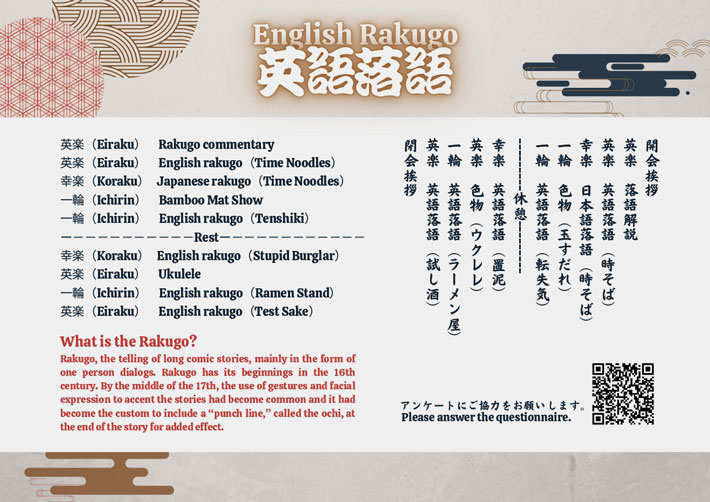
English Rakugo program created by student organizers
A total of 52 participants, including international students from Canada, Taiwan, Thailand, Poland, Germany, the Philippines, and other countries and regions offered a warm welcome to legendary rakugo performers Eiraku Kanariya, Koraku Kanariya, and Ichirin Kanariya from the English Rakugo Association as they took to the stage. In addition to the main performances, audience members were also treated to iromono, or separate music and street performances between the main acts, to create an atmosphere that resembled that of an actual Japanese-style yose theater.
This event was held as part of the Student Success Support Project, an initiative supported by Gurunavi Inc. Chairman and Director Hisao Taki, a Tokyo Tech alumnus. As in previous years, the event was co-organized by the Student Support Center's Student Success Support Section, the Student Support Division's Support Planning Group, and the Tokyo Tech Alumni Association.
Moderating the event in Japanese and English were Student Success Support Project student organizers Risako Yanagase and Teru Hashimoto.
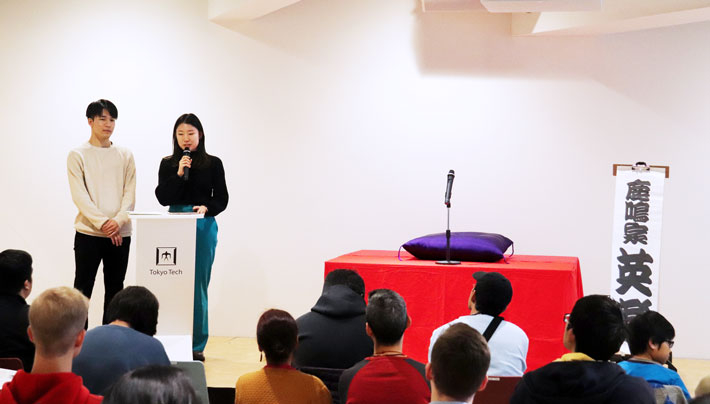
Student moderators Hashimoto (left) and Yanagase
The program kicked off with an English rakugo commentary by Eiraku, who offered a simple, clear explanation of some of the rules of rakugo. These included the use of kamite, stage left from the performer's perspective, and shimote, stage right from the performer's perspective, to describe different characters, and the use of props such as fans. Eiraku kept his audience engaged and entertained throughout the commentary, allowing them to learn more about this Japanese art form while enjoying themselves.
After this, the participants watched an English performance of Time Noodles by Eiraku, followed by the same story in Japanese by Koraku. By listening to the same performance in different languages, the participants were able to grasp the differences in nuances and expressions.
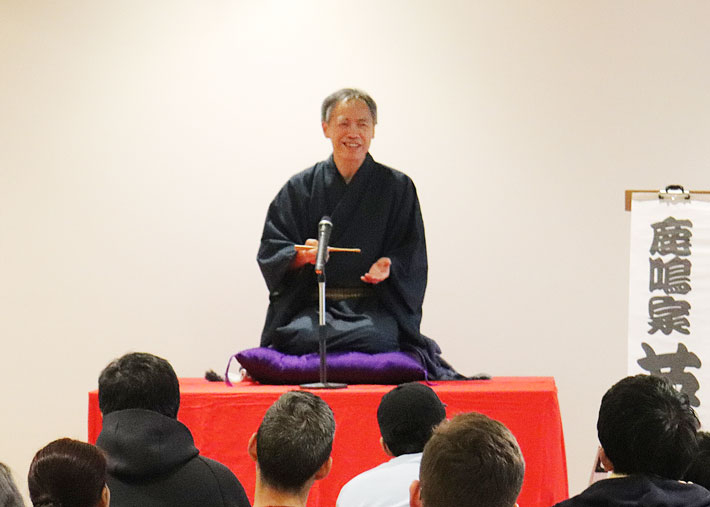
Eiraku delivering Time Noodles performance in English
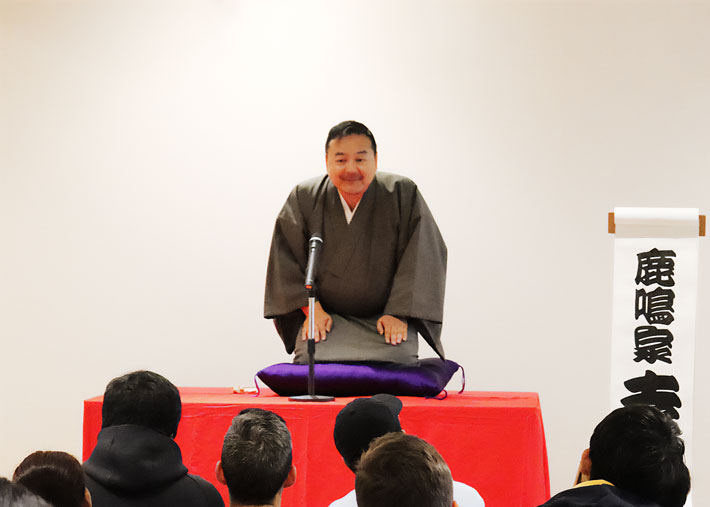
Koraku during his version of Time Noodles in Japanese
Next, Ichirin gave a tamasudare performance. It was the first time for many of the audience members to see a traditional bamboo mat performance, and they followed it with great interest.
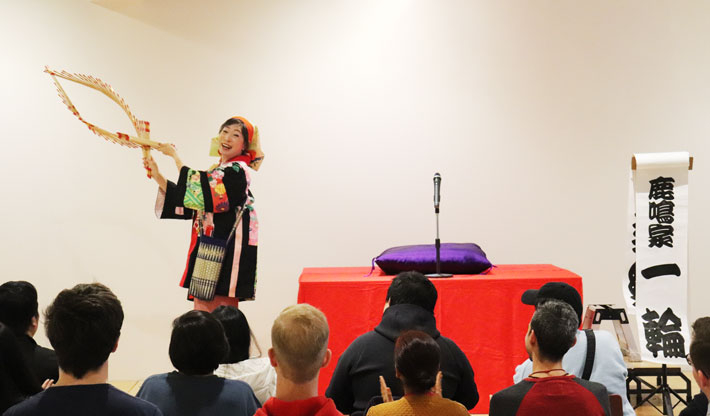
Tamasudare bamboo mat performance by Ichirin
After this, participants listened to four English rakugo performances, each with smooth storytelling, interesting body movements and gestures, and unique use of props. The audience was impressed. Laughter often coincided among both Japanese and international participants, suggesting that audience members understood the essence, regardless of their backgrounds.
During one of the intermissions, Eiraku offered his version of the iromono performance, Ukulele. The same song was performed in both Japanese and English, interspersed with jokes specific to the Japanese language that are difficult to render into English. Both the Japanese participants and international students enjoyed the different plays on words in both languages. Everyone appeared to enjoy the event from start to finish.
Student Success Support Project student organizers Namkyong Kim and Ryota Uehara emceed the event's closing, and Professor Sachiko Ito, head of the Student Support Center's Student Success Support Section, gave a brief speech to thank the rakugo performers and participants. "We will continue to plan events that promote interaction and exchange with Japanese culture, and we hope you will join us again next time," she concluded.
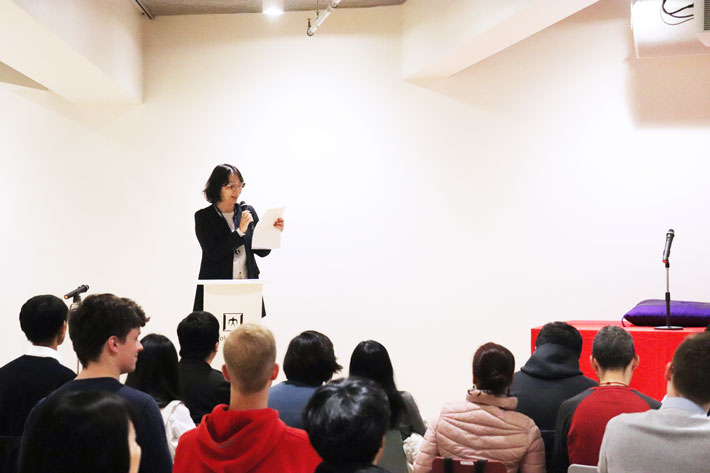
Prof. Ito with some closing words
After a commemorative photo of all those present, students Kim and Uehara also offered some closing words in English and Japanese. Some participants stayed behind after the event to chat and take photos with the rakugo performers, while others were keen to hear a more detailed explanation of the bamboo mat performance.
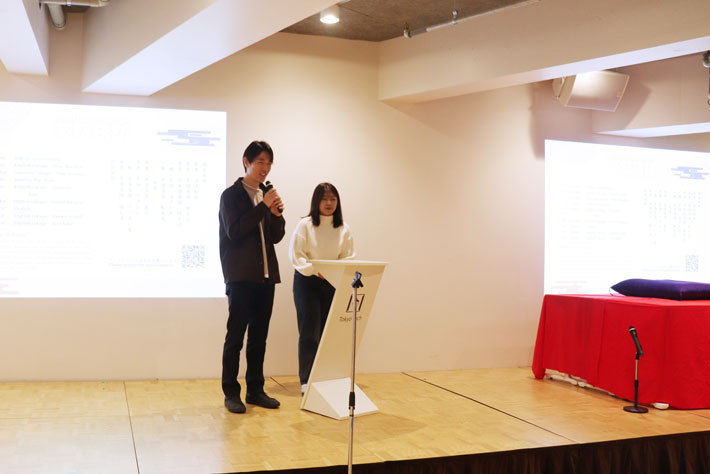
Event closing emcees Uehara (left) and Kim
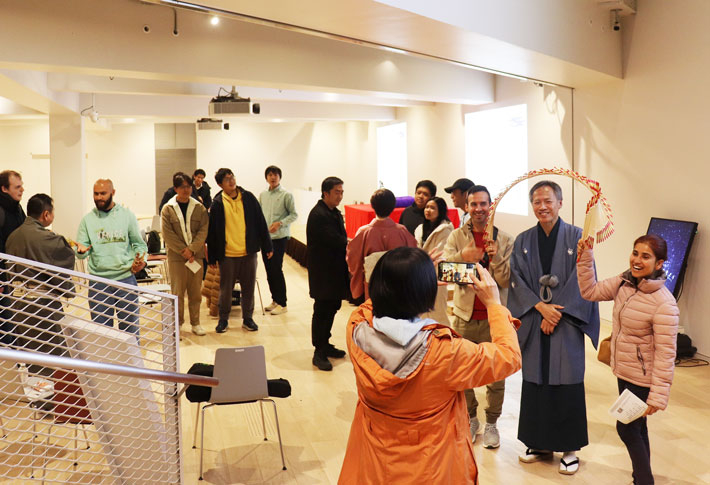
Enjoying exchanges and photos after event
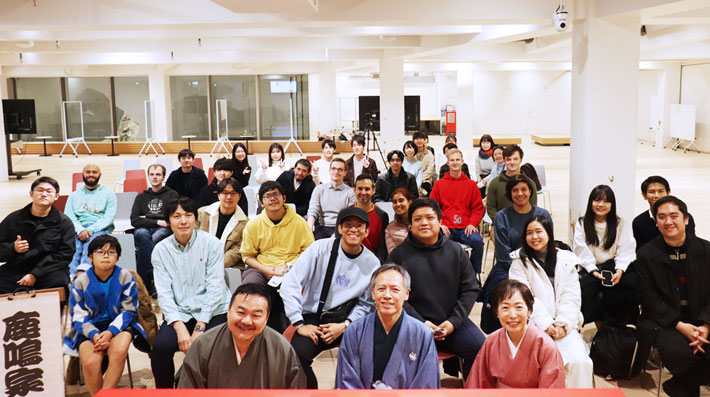
Group photo of performers and participants
Comments from participants
It was an amazing cultural immersion.
It had been a long time since I had seen rakugo, and this was my first time to experience it in English. I have some experience trying the tamasudare and Ukulele performances myself, but I am a beginner. I very much enjoyed the storytelling and singing in English.
Everything was amazing!
Comments from Student Success Support Project student organizers
Risako Yanagase
1st-year master's student, Transdisciplinary Science and Engineering
I am delighted that we were able to hold English Rakugo successfully. Although this event was mainly aimed at international students, we were able to create a unique atmosphere with the participation of Japanese students and local residents. I am sure many people enjoyed watching the performances of the invited storytellers. Some seemed so impressed that they could probably sense the "noodles" in front of them. Others talked to the rakugo storytellers and asked them questions after the event was over. Everyone seemed to enjoy the event in their own way.
Through this event, I was able to experience Japanese culture from a very different perspective. As I am planning to study abroad next year, I am sure that I will have more opportunities to "look at Japan from the outside" in the future. Particularly in that sense, it was very meaningful to experience this event before my travels.
This event could not have been such a success without the help of all the project members, faculty, and staff. Thank you very much for your kind support. We hope to plan various events in the future and continue our student support activities at Taki Plaza. We look forward to your support and cooperation.
Namkyong Kim
3rd year, Materials Science and Engineering
I am very pleased that we were able to organize a rakugo event in English at Taki Plaza, a place for international exchange. As an international student myself, I learned about rakugo in my Japanese classes and watched it on videos, but I did not have many opportunities to see it live. I think that this live rakugo on campus was a great opportunity for international students, including myself. We tried to make it enjoyable for Japanese people as well and showed the same story in both Japanese and English. I think this made it possible for Japanese students to see how a familiar story can be expressed in English.
As an international student, I often have to introduce my own culture to others, and this event was a great way to acquire some new skills that are useful in such interactions.
Ryota Uehara
1st-year master's student, Materials Science and Engineering
I am so glad we were able to recreate the atmosphere of a yose theater at Taki Plaza, and I was happy to see so many participants enjoying the English rakugo performances. During the breaks, it was great to see many people, including international students, actually touching and experiencing the tools used in the iromono performances. I am sure this was a good opportunity for the international students to experience the appeal of rakugo, a part of traditional Japanese culture.
I have many opportunities to engage with international students in my research activities, and I felt that introducing them to English rakugo would help them become more familiar with Japanese culture.
Teru Hashimoto
1st-year master's student, Transdisciplinary Science and Engineering
I was looking forward to seeing how the performers would express the unique storytelling expressions in English.
Since this was my first event as a member of the Student Success Support Project, I was both nervous and excited as we planned the event.
Most of the talks and stories I hear on a daily basis are about science-related topics, but after this event, I would like to continue to be exposed to a broader range of culture without limiting my horizons.
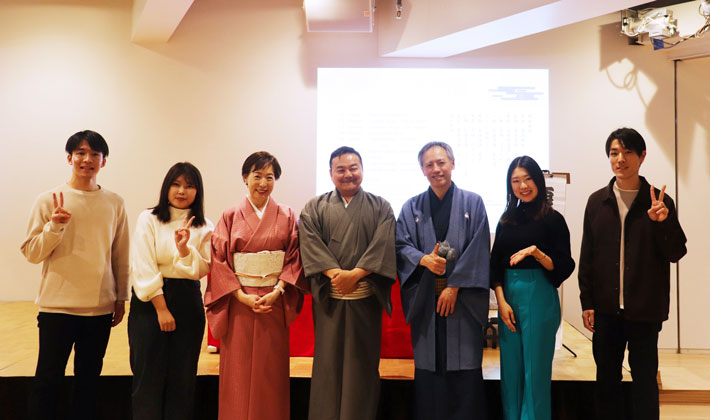
English Rakugo Association performers (three in center) with Student Success Support Project student organizers
This event presented a wonderful opportunity for international students to experience true Japanese culture, but also offered local participants a different perspective on the art of rakugo. The organizers look forward to hosting more cultural events that transcend borders at Taki Plaza.
. Any information published on this site will be valid in relation to Science Tokyo.













